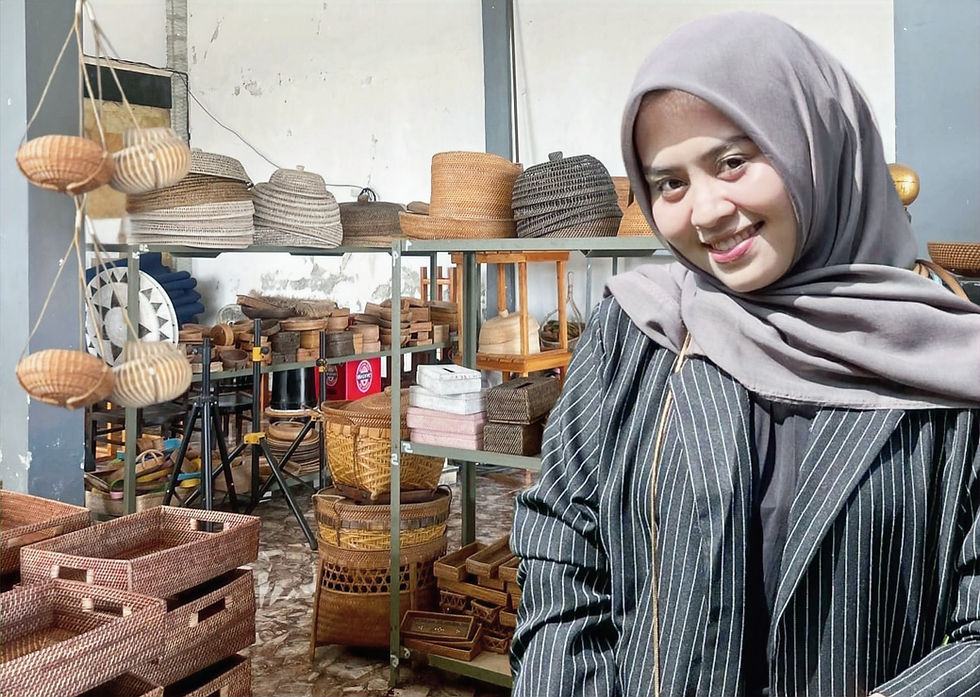Weaving a Living Legacy: Dende Iba Putrisya Umar Switches from Law Graduate to Rattan Weaver
- Aug 7, 2025
- 3 min read

MATARAM, August 3, 2025 – Within the graceful rattan woven with patience lies a story of heritage, innovation, and the determination of a young woman. Dende Iba Putrisya Umar, S.H. (Bachelor of Law), doesn't just see rattan as a natural fiber. In her eyes, it is a living cultural canvas of West Nusa Tenggara (NTB) woven from history, colored by local identity, and presented to the world.
As the new Chairwoman of the Indonesian Furniture and Craft Industry Association (HIMKI) NTB, she strives to carry this traditional weaving across geographical and imaginative borders. NTB's rattan crafts are not ordinary products. They are visual poems born from the skilled hands of artisans. Their warm colors—light brown, cream, golden—evoke the warmth of the tropical earth.
Their smooth yet sturdy texture symbolizes the resilience of the community. Every geometric pattern and traditional ornament within them is a story: weaving motifs, Bima-Sumbawa traditional symbols, or ancestral philosophies that remain relevant.
"Our rattan is not just furniture," says Dende, Marketing and Finance Manager of CV. Bijaksana, with sparkling eyes. "It is an identity that speaks through form." From elegant chairs, vases, to hanging lamps, NTB rattan meets modern needs without burying traditional roots. Now, the touch of minimalist design from young artisans makes it even more beloved by the global market.
Challenges Behind the Beauty
As a millennial, Dende doesn't wait. She brings NTB rattan into the digital world with tactical steps:
Branding via Social Media: Instagram, Facebook, and TikTok are filled with aesthetic content—production processes, customer testimonials, and home decor ideas.
Expansion to Marketplaces: Products are sold on Shopee, Tokopedia, and even Etsy for the global market.
Precise Paid Advertising: Facebook and Instagram Ads target potential audiences.
Educational Content: Short videos about rattan furniture care or the story behind its creation. "Digitalization is not an option, but a necessity," Dende emphasized in a casual conversation
Dende hopes the local government will provide cargo facilities to shorten the distribution chain. Meanwhile, she conveys a request to HIMKI Central for support in obtaining sustainable, quality rattan raw materials. She also asks for training in finishing. "Good materials are the foundation of superior products," she stated.
As a law graduate with a concentration in business law, her educational background has ironically become a weapon. Her thesis on Central Lombok rattan crafts helped her understand the complexities of a culture-based business.
Under her leadership, Dende plans to expand her work area. HIMKI NTB currently only reaches Central, West, and East Lombok. Dende aspires to extend the network to North Lombok, Sumbawa, Dompu, and Bima. "Every region has its unique crafts. They deserve guidance and market access," she determined.
Her optimism is not one-sided. She is confident that NTB furniture and rattan crafts—from rattan weaving, ikat weaving, wood carving, to pearls—can become an icon of Indonesia's creative economy. "We have a rich culture, skilled artisans, and a youthful spirit. With collaboration, NTB rattan will go global!"
Her life principle also resonates in this struggle: "Do your best, and leave the results to God." In Dende's hands, rattan is no longer just a commodity. It is hope woven for shared prosperity.
Dende is concerned. Despite its charm, the path for NTB rattan is not always smooth. The biggest challenge? Logistic infrastructure. "The absence of cargo in NTB forces us to ship goods via Bali," Dende complained. The impact: soaring costs, delayed delivery times, and difficulty in market expansion. Yet, demand from overseas continues to flow.
Another issue lies in finishing technology. Most artisans still rely on manual techniques using peka (pine resin) and gambier. "Modern design and finishing training are desperately needed for us to compete at an international level," she added. (PosSore/aryodewo)





















Comments